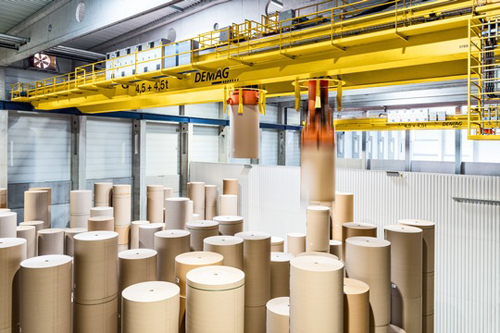Norske Skog has awarded a contract to Demag to design and implement a fully automatic paper roll store at its location in Golbey, France, as part of its ongoing conversion project at the Golbey site to produce 550,000 tonnes of recycled containerboard.
The basic requirement is to perform up to 160 roll movements per hour during peak periods. The most cost-effective solution for this challenge is for these handling volumes to be tackled with four automatic cranes, each of which will have two hoists that can operate independently of each other to ensure fast and flexible finished goods handling in a compact space, even when working through peak workloads.
Rolls with a diameter of 1.40 m will be stored in stacks up to a height of 15 m at approximately 2,470 locations. The store layout is flexible, meaning that it can be adjusted to accommodate rolls with smaller and larger diameters. The store will feature space for a total of almost 15,000 rolls with a total weight of 41,400 tonnes when 100% full. To cater for future product variants, experience shows that the store will be operated at a capacity of 75%, with approximately 31,000 tonnes. Since PM1 will have an annual capacity of 550,000 tonnes recycled containerboard, this means that the warehouse will be replenished almost 18 times a year. The handling volume per hour is large; the forecast is that a maximum of 80 rolls will have to be stored and up to 140 rolls will have to be retrieved or re-arranged. On average, the actual numbers will be 32 and 104, respectively. This entails demanding requirements regarding the automatic cranes’ capacity and performance and will require a smooth and smart logistics process. Just like with all projects, this process will be developed together with the customer and the conveyor equipment supplier and adjusted in line with future needs. From a warehouse management system perspective, the corresponding analyses and developments will include the entire material flow management from the winder downstream of the paper machine to loading the finished products onto trucks.




